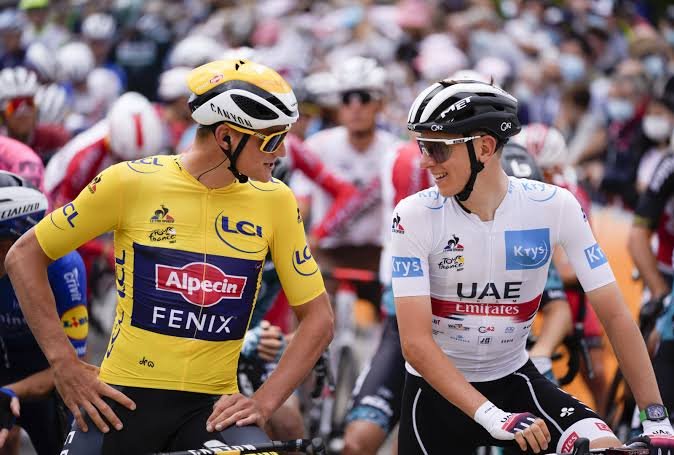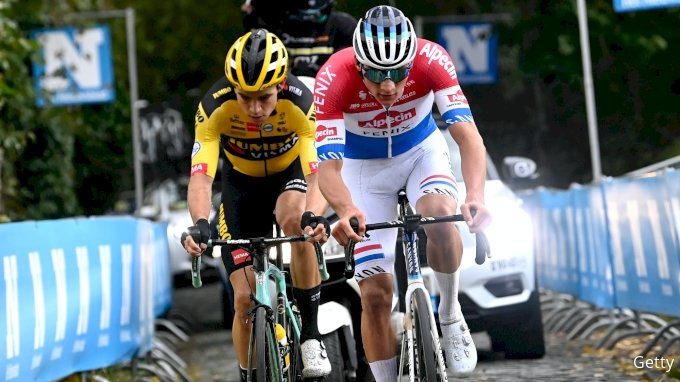
Cold rain is becoming an essential feature of La Flèche Wallonne, even though the event occurs well into the “spring” Classics. When Mur de Huy approaches, it feels like the gods themselves wished to witness the riders’ struggles. There was, however, one individual who remained entirely unfazed by the event on Wednesday – Tadej Pogacar.
All the riders were missing explosiveness. “With the exception of a single individual,” Karl Vannieuwkerke starts his narrative on the Sporza website. “They attempted to turn it into a challenging race.” Ultimately, they are so cautious of one another that they hold off until the Mur. “Then there is a man who stands apart,” adds José De Cauwer.
La Flèche Wallonne is not only challenging due to its course, but the weather often intensifies the difficulty – and once more this year, the weather was a crucial factor. “Remco Evenepoel held a strong position until they arrived at the Mur, yet the gap was significant in the conclusion.” However, the situation was identical for Pidcock and Healy. Nobody considered for a second: ‘I must accompany Pogacar.’
Adversaries might have wished that the Slovenian would be a bit rattled following his loss at the Amstel Gold Race, but those hopes went unanswered. As soon as Pogacar launched on Mur de Huy, the competition was instantly finished. It’s a significant setback for anyone aiming to challenge the world champion in the remaining Ardennes events.
Sunday marks the last spring classic, and Pogacar will once more be the main contender. “A highly driven Pogacar will be at the starting line.” “Following the Amstel Gold Race, some believed there was an issue with Pogacar, but De Cauwer states that the positive indicators remain evident.” Vannieuwkerke concurs: “Any hint of uncertainty has been entirely removed today.”
The victory at La Flèche Wallonne further solidified Pogacar’s dominance in the Ardennes, a region that often separates great cyclists from legends. While many expected a more balanced showdown following his rare defeat at Amstel Gold, Pogacar once again showed why he is regarded as the most versatile rider of his generation. His acceleration on the Mur de Huy was not just a tactical move; it was a statement.
José De Cauwer, a seasoned analyst and former professional cyclist, seemed almost in awe of Pogacar’s performance. “It wasn’t just the burst,” De Cauwer elaborated. “It was the ease with which he did it. Everyone else was suffering, grimacing in the rain, and Pogacar looked like he was on a Sunday ride. Nobody even imagined they could keep up with him.”
The Belgian cycling community had high hopes for their homegrown talents, particularly Remco Evenepoel, who had been in stellar form leading up to the race. Evenepoel managed to hold a respectable position until the dreaded final climb, but like so many others, he simply couldn’t match the Slovenian’s power. “Remco did what he could, but Pogacar was on another level,” Vannieuwkerke noted.
It wasn’t just Evenepoel who faltered. British rider Tom Pidcock and Ireland’s Ben Healy, both considered dark horses for the race, found themselves struggling under the relentless gradient of the Mur. “They rode smart races,” De Cauwer said. “But when Pogacar made his move, you could see the resignation in their faces. They knew it was over.”
The weather, as always, played its part in shaping the race. The cold, relentless rain turned the roads slick and the air biting, conditions that typically sap riders’ energy and morale. Yet, for Pogacar, it appeared to be just another day at the office. His team, UAE Team Emirates, positioned him perfectly throughout the race, shielding him from the wind and keeping him out of trouble.
Speculation had swirled about Pogacar’s condition after his unexpected loss at the Amstel Gold Race. Some critics suggested that the grueling early season might have taken its toll. Others hinted that rivals were finally figuring out how to counter his aggressive style. Those theories were firmly put to rest on the slopes of the Mur de Huy.
“People love to create drama,” Pogacar said post-race, with a grin. “I had a bad day at Amstel. It happens. But today, I felt good. The team was fantastic, and we executed the plan perfectly.”
As the peloton now shifts its focus to Liège–Bastogne–Liège, the final monument of the spring, the question on everyone’s mind is whether anyone can challenge Pogacar. Liège is a longer, arguably tougher race, but it also suits Pogacar’s strengths. His combination of endurance, tactical acumen, and climbing ability makes him the clear favorite once again.
“There’s always a chance,” De Cauwer said, when asked if anyone could upset Pogacar on Sunday. “Cycling is unpredictable. But right now, if you’re betting against him, you’re either very brave or very foolish.”
For the fans, Pogacar’s dominance is a spectacle, but for his competitors, it’s becoming a daunting psychological barrier. How do you race against someone who seems impervious to both the elements and his own limits?
As Vannieuwkerke aptly summarized, “What we saw today wasn’t just a victory; it was a message. Tadej Pogacar isn’t just back—he never left.”


